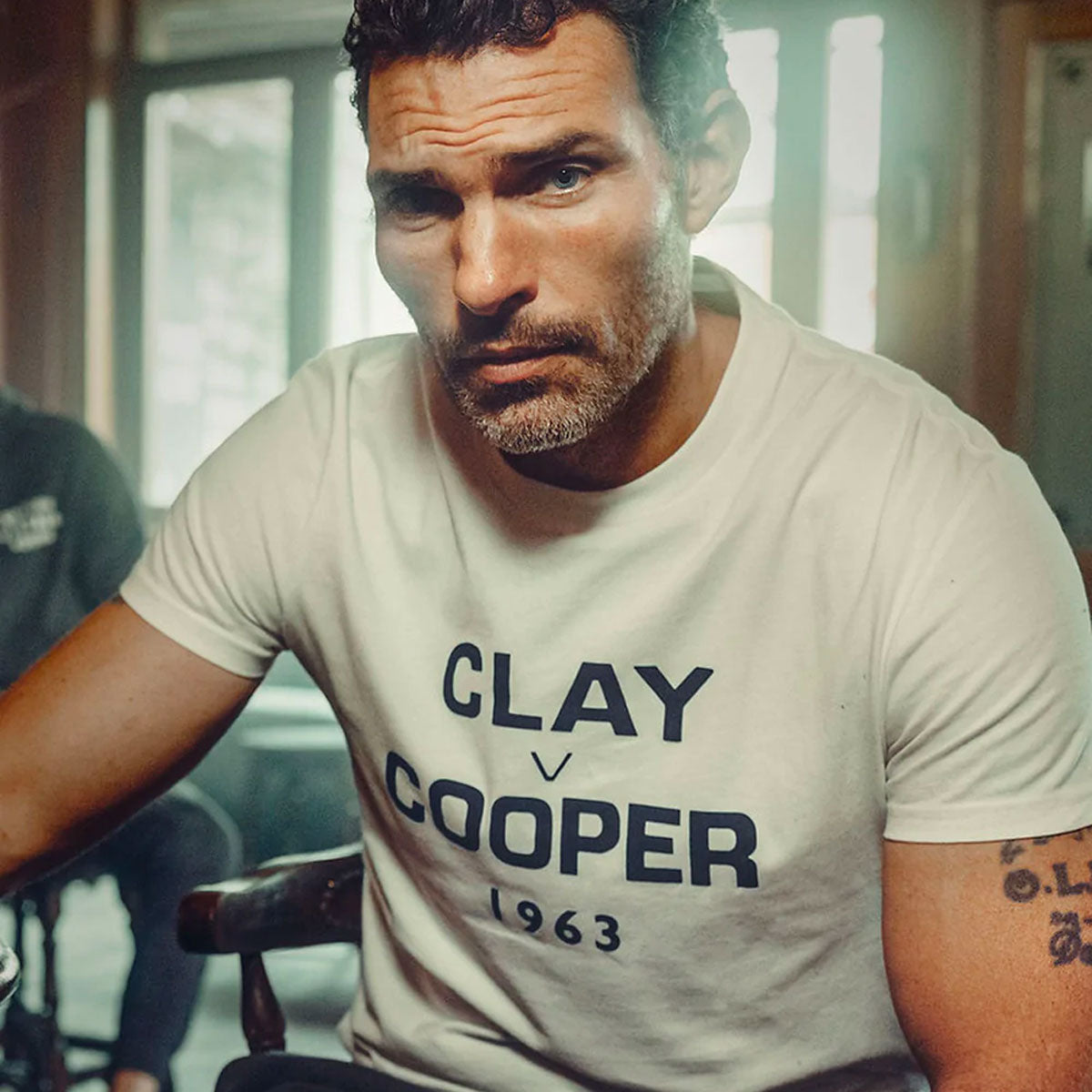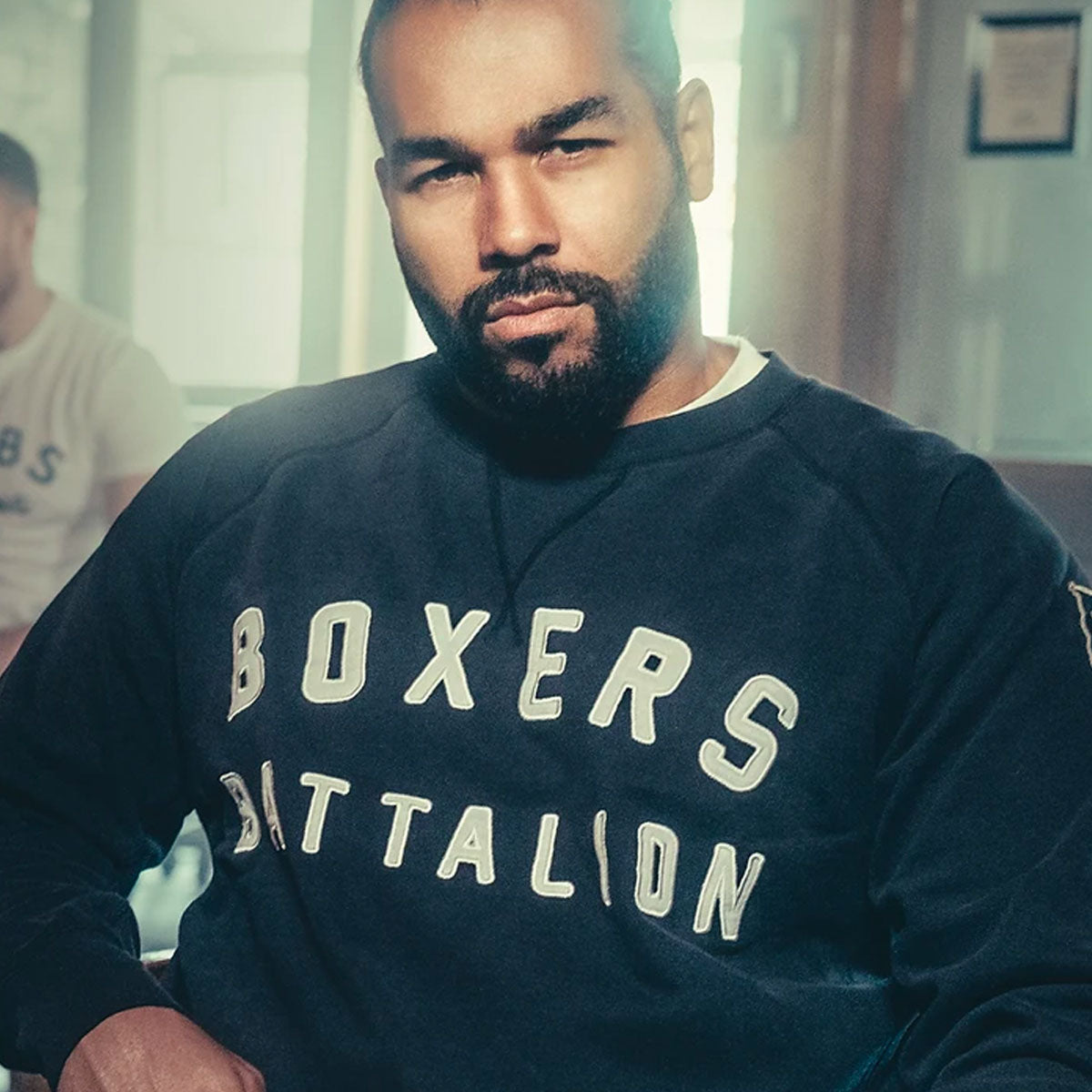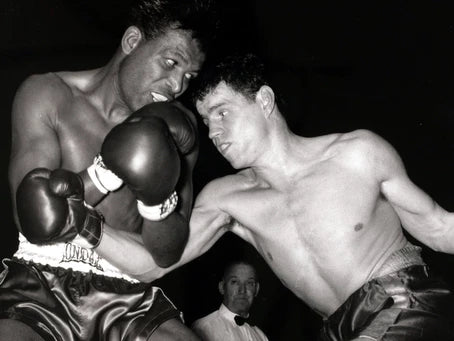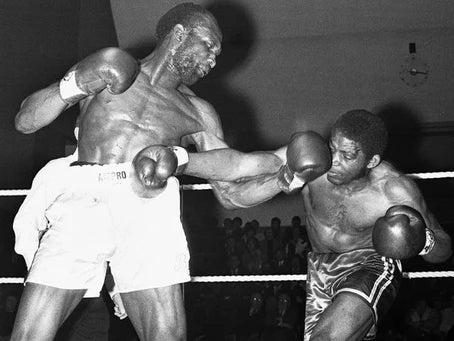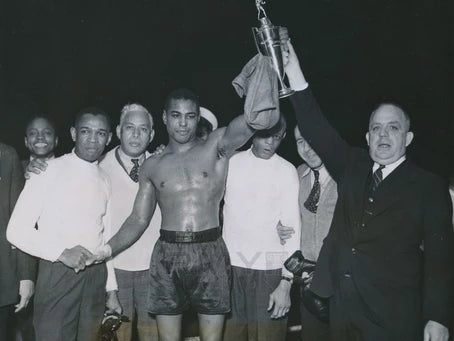Contributed by Paul Zanon

On 9 May 1936, Luis Firpo fought Saverio Grizzo and Jimmy Wilde fought Domingo Sciaraffia. In other boxing news, a certain Terence Richard Downes was born in Paddington, London.
Downes father, Richard, a mechanic by trade was the first person to teach young Terry the basics, which apparently came in handy for his encounters on the streets of Paddington. However, his skills were honed at Fischer ABC, where he amassed silverware in numerous school tournaments and area championships.
Keen to prepare for one particular bout against Ron Hillier in the semi-finals of a tournament in London, Downes picked up a boxing book, looking for a few essentials pointers. As he was browsing through, he came across a photo of Hillier demonstrating boxing technique. Downes reportedly said, ‘Bloody hell. How am I supposed to beat him? He’s showing me how to fight!’
Despite losing to Hiller, through a dark twist of fate Downes ended up progressing his career in the United States. His 18 year old sister Sylvia, who was in the circus, was involved in a bus accident in 1952 and lost her arm. The Downes family raised money to send Sylvia’s mother to be with her, then Terry and his dad followed. Within no time the family were residing in America. Young Downes was 17 at the time.
Downes continued boxing, initially representing the YMCA, but after gaining victory against a U.S. Marine, he was convinced to join the corps. He fought over 50 times for the Marines all over the U.S. losing only a handful of contests along the way, on points.
As a Marine, Downes won his fair share of silverware, including the Amateur Golden Gloves and the All Services Championship, defeating Pearce Lane. Despite fighting in the Olympic trials, Downes was refused entry onto the U.S. Boxing Team due to not holding U.S. citizenship. Instead, Lane represented the U.S. in the welterweight division at the Olympics in Melbourne in 1956, although he failed to achieve medal status. Aged 89, Lane is still alive today.
With his Olympic dream shattered and an estimated 150 amateur fights to his name, with Downes claiming only four losses, the crowd pleasing sensation returned to the UK and made his debut on 9 April 1957, aged 20 years old. The Paddington Express ran over Peter Longo in the opening session at the Harringay Arena, then 21 days later stopped 38 fight journeyman, Jimmy Lynas in the third round.

By now Downes was managed by Sam Burns, who at the time worked with world renowned promoter Jack Solomons, as his right hand man. However, over the years, Burns joined forces with the likes of Jarvis Astaire, Mike Barrett, Mickey Duff and Harry Levene, guiding many top grade boxers to world title challenges over several decades. With an acute business brain, he acted as a good financial guide to Downes over his career.
Downes next fight could only be described as abysmal matchmaking from Mickey Duff. Only two weeks after the Lynas fight and barely one month into his professional apprenticeship, Downes was pitted against a fearsome young Nigerian called Richard Ihetu, more commonly known in boxing circles as Dick Tiger.

On paper, Tiger brought a 20-8 record to the ring, but all eight of those fights came via points losses and many had been highly debated for years. Duff had chosen Tiger as a stiff test for Downes, but the two fight novice had no business being in the ring with a future two weight world champion. Downes took a one-sided beating at the hands of Tiger and didn’t make the final bell. After the contest, Downes was quoted as saying, ‘I thought, fucking hell they’ve put me in with a giant. Then I realised I was flat on my back looking up at him!’
Bouncing back a mere three weeks after his fifth round defeat, Downes knocked out Alan Dean and in his next 15 contests, Downes improved his record to 16-3, with 13 stoppages. His come forward aggressive style, which earned him almost 400 stiches to his face over the years, was a guaranteed crowd pleaser and on 30 September 1958 he was rewarded with a shot at the British middleweight title.
Only 17 months on from his debut, on 30 September 1958, Downes was back at the Harringay Arena, but this time against an opponent with an impressive 46-3-3 record. Welshman Phil Edwards had held the Welsh Area middleweight title and despite putting up a gutsy performance, was simply worn down by the audacious Londoner in the 13th round.
The same year, Downes married Barbera Clarke. They would remain together until his death, totalling almost 60 years of marriage. They went on to have five children, one of whom became a sports writer and renowned comedian, James McNicholas.

Back to the boxing. Six weeks after being crowned British champion, Downes knocked out Algerian born Frenchman, Mohammed Ben Taibi in three rounds. However, his next four fights wouldn’t indicate a future world champion in the making. With the exception of a seventh round stoppage of Frenchman Andre Davier on 7 July 1959, Downes lost against American, Spider Webb (great name), Frenchman Michel Diouf and more painfully, an eighth round disqualification against John ‘Cowboy’ McCormack (22-1 at the time) on 15 September 1959, losing his British title and also the opportunity to amass the Commonwealth strap. Downes now boasted a professional record of 19-6.
The rematch against McCormack was set up six weeks after the first encounter, but this time, Downes was on blistering form stopping ‘The Cowboy’ in the eighth session and by doing so picking up the British and Commonwealth middleweight titles. Over the next 11 months, Downes clocked up five further victories, four by stoppage. However, it was the win against 107 fight veteran Joey Giardello on 11 October 1960 at Empire Pool, Wembley which gained worldwide acclaim. Many thought cheeky Downes would try to steamroll Giardello, but it was the Londoner’s boxing skill which generated the victory.
Incredibly, despite his 82-18-7 record, Giardello was far from peaking in his career. Six months prior to his clash with Downes he walked away with a split decision draw against Gene Fullmer, for the NBA world middleweight title and three years after his clash with Downes, in 1963, he beat Dick Tiger to become the WBC and WBA world middleweight champion. He held the crowns for two years.
With the media spotlight on Downes, three months after Giardello he packed his bags and headed Stateside to Boston, Massachusetts to take on the reigning middleweight world champion, Paul Pender. The American was fresh off two back to back split decision wins against ring legend, Sugar Ray Robinson and on 14 January 1961 at the Arena, Boston, Pender proved too much for the eager 24 year old Londoner. Stopping Downes in the seventh round, three months later Pender successfully defended his title against ‘The Upstate Onion Farmer’ Carmen Basilio.
Not one to rest on his laurels, while Pender took on Basilio, Downes improved his record by another two stoppage victories, putting him in pole position for another shot at Pender’s world title. Less than six months after their first encounter, Pender made the bold move to travel to the other side of the pond, which didn’t work out as he expected. On 11 July 1961, with an insatiable desire to win, Downes forced Pender into retirement in the ninth round at the Empire Pool Wembley.

While the punters were backing Downes at the bookies, Downes, alongside his manager Burns, invested heavily into the bookmaking industry, opening a string of shops on the back of his newly crowned status. The investment would prove to be more than prudent, providing them both with a lifetime fortune far beyond boxing.

Nine months after being crowned world champion, Downes travelled back to Pender’s backyard for the third and final instalment of the rubber match. On 7 April 1962, Pender regained his world title with a debatably close points victory at Boston Garden and retired straight after the fight. After the first two fights Pender realised the risks in standing toe to toe with Downes and opted to use his height and reach to full advantage, suffocating Downes’ attacks.
In the next five months Downes clocked up two further points victories against big name Americans, Don Fullmer and ageing Sugar Ray Robinson, albeit, a humble Downes was the first to acknowledge, ‘I didn’t beat Sugar Ray Robinson. I beat his ghost.’
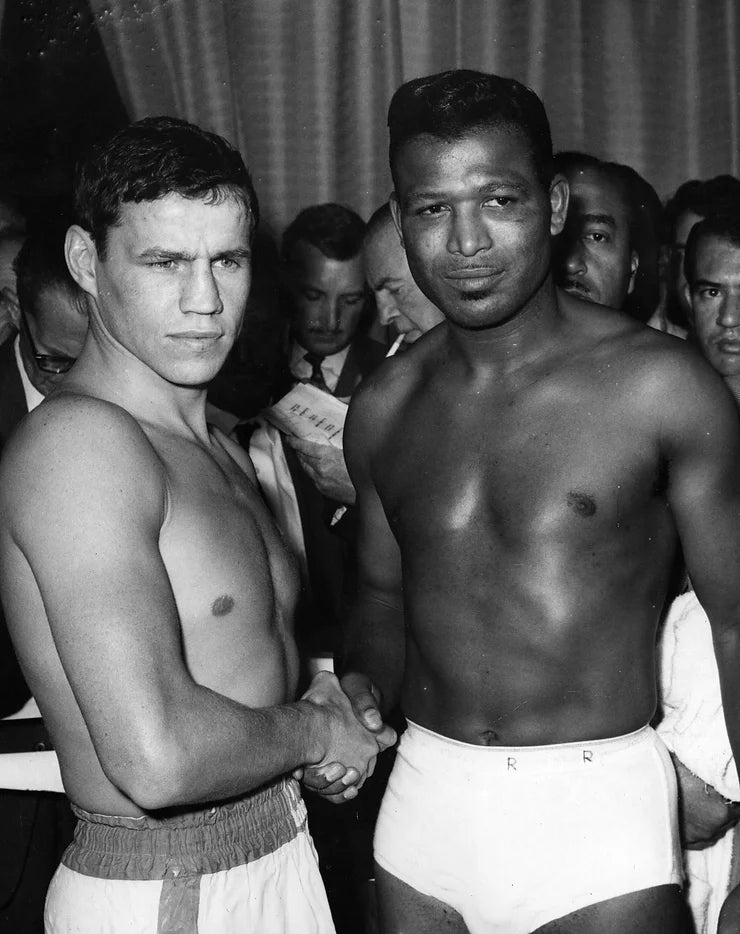
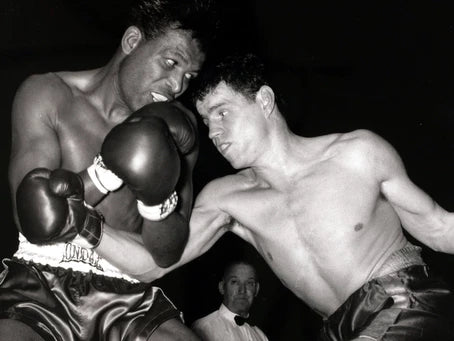

Over the next two years, Downes won a further five fights, including four by stoppage, before taking on Louisiana’s favourite fighting son, reigning light heavyweight champion Willie Pastrano. Back then, there wasn’t the luxury of super middleweight. You either fought at 160lbs or moved up to 175lbs, which was a gutsy move for Downes because he was far from a natural light heavyweight. Despite only weighing 171lbs on the evening, Downes emptied his tank on 30 November 1964 at King’s Hall, Belle Vue, Manchester and went out on his shield with an eleventh round stoppage at the hands of Pastrano.
Downes retired after that fight at only 28 years old, boasting British, Commonwealth and world titles. With a healthy record of 35-9, Downes stuck to his word and was never lured back by the old boxing adage of ‘one more fight’. Financially he was set with his bookmakers investment and later on owned a car dealership and a nightclub in London.

Downes maintained a strong interest in boxing after retirement and would often be the first port of call for sports commentators when looking for a colourful opinion of a fighter or fight. Despite not publicising his charitable efforts, Downes was a well known figure on the fundraising circuit and in 2012 was justly awarded the BEM (British Empire Medal) for services to sport and philanthropic efforts. Dabbling in film and television appearances, the final curtain came down on the vastly charismatic Downes on 6 October 2017, aged 81. He reportedly died from kidney failure.
Paul Zanon, has had nine books published, with almost all of them reaching the No1 Bestselling spot in their respective categories on Amazon. He has co-hosted boxing shows on Talk Sport, been a pundit on London Live, Boxnation and has contributed to a number of boxing publications, including, Boxing Monthly, The Ring, Daily Sport, Boxing News, Boxing Social, amongst other publications.

On 9 May 1936, Luis Firpo fought Saverio Grizzo and Jimmy Wilde fought Domingo Sciaraffia. In other boxing news, a certain Terence Richard Downes was born in Paddington, London.
Downes father, Richard, a mechanic by trade was the first person to teach young Terry the basics, which apparently came in handy for his encounters on the streets of Paddington. However, his skills were honed at Fischer ABC, where he amassed silverware in numerous school tournaments and area championships.
Keen to prepare for one particular bout against Ron Hillier in the semi-finals of a tournament in London, Downes picked up a boxing book, looking for a few essentials pointers. As he was browsing through, he came across a photo of Hillier demonstrating boxing technique. Downes reportedly said, ‘Bloody hell. How am I supposed to beat him? He’s showing me how to fight!’
Despite losing to Hiller, through a dark twist of fate Downes ended up progressing his career in the United States. His 18 year old sister Sylvia, who was in the circus, was involved in a bus accident in 1952 and lost her arm. The Downes family raised money to send Sylvia’s mother to be with her, then Terry and his dad followed. Within no time the family were residing in America. Young Downes was 17 at the time.
Downes continued boxing, initially representing the YMCA, but after gaining victory against a U.S. Marine, he was convinced to join the corps. He fought over 50 times for the Marines all over the U.S. losing only a handful of contests along the way, on points.
As a Marine, Downes won his fair share of silverware, including the Amateur Golden Gloves and the All Services Championship, defeating Pearce Lane. Despite fighting in the Olympic trials, Downes was refused entry onto the U.S. Boxing Team due to not holding U.S. citizenship. Instead, Lane represented the U.S. in the welterweight division at the Olympics in Melbourne in 1956, although he failed to achieve medal status. Aged 89, Lane is still alive today.
With his Olympic dream shattered and an estimated 150 amateur fights to his name, with Downes claiming only four losses, the crowd pleasing sensation returned to the UK and made his debut on 9 April 1957, aged 20 years old. The Paddington Express ran over Peter Longo in the opening session at the Harringay Arena, then 21 days later stopped 38 fight journeyman, Jimmy Lynas in the third round.

By now Downes was managed by Sam Burns, who at the time worked with world renowned promoter Jack Solomons, as his right hand man. However, over the years, Burns joined forces with the likes of Jarvis Astaire, Mike Barrett, Mickey Duff and Harry Levene, guiding many top grade boxers to world title challenges over several decades. With an acute business brain, he acted as a good financial guide to Downes over his career.
Downes next fight could only be described as abysmal matchmaking from Mickey Duff. Only two weeks after the Lynas fight and barely one month into his professional apprenticeship, Downes was pitted against a fearsome young Nigerian called Richard Ihetu, more commonly known in boxing circles as Dick Tiger.

On paper, Tiger brought a 20-8 record to the ring, but all eight of those fights came via points losses and many had been highly debated for years. Duff had chosen Tiger as a stiff test for Downes, but the two fight novice had no business being in the ring with a future two weight world champion. Downes took a one-sided beating at the hands of Tiger and didn’t make the final bell. After the contest, Downes was quoted as saying, ‘I thought, fucking hell they’ve put me in with a giant. Then I realised I was flat on my back looking up at him!’
Bouncing back a mere three weeks after his fifth round defeat, Downes knocked out Alan Dean and in his next 15 contests, Downes improved his record to 16-3, with 13 stoppages. His come forward aggressive style, which earned him almost 400 stiches to his face over the years, was a guaranteed crowd pleaser and on 30 September 1958 he was rewarded with a shot at the British middleweight title.
Only 17 months on from his debut, on 30 September 1958, Downes was back at the Harringay Arena, but this time against an opponent with an impressive 46-3-3 record. Welshman Phil Edwards had held the Welsh Area middleweight title and despite putting up a gutsy performance, was simply worn down by the audacious Londoner in the 13th round.
The same year, Downes married Barbera Clarke. They would remain together until his death, totalling almost 60 years of marriage. They went on to have five children, one of whom became a sports writer and renowned comedian, James McNicholas.

Back to the boxing. Six weeks after being crowned British champion, Downes knocked out Algerian born Frenchman, Mohammed Ben Taibi in three rounds. However, his next four fights wouldn’t indicate a future world champion in the making. With the exception of a seventh round stoppage of Frenchman Andre Davier on 7 July 1959, Downes lost against American, Spider Webb (great name), Frenchman Michel Diouf and more painfully, an eighth round disqualification against John ‘Cowboy’ McCormack (22-1 at the time) on 15 September 1959, losing his British title and also the opportunity to amass the Commonwealth strap. Downes now boasted a professional record of 19-6.
The rematch against McCormack was set up six weeks after the first encounter, but this time, Downes was on blistering form stopping ‘The Cowboy’ in the eighth session and by doing so picking up the British and Commonwealth middleweight titles. Over the next 11 months, Downes clocked up five further victories, four by stoppage. However, it was the win against 107 fight veteran Joey Giardello on 11 October 1960 at Empire Pool, Wembley which gained worldwide acclaim. Many thought cheeky Downes would try to steamroll Giardello, but it was the Londoner’s boxing skill which generated the victory.
Incredibly, despite his 82-18-7 record, Giardello was far from peaking in his career. Six months prior to his clash with Downes he walked away with a split decision draw against Gene Fullmer, for the NBA world middleweight title and three years after his clash with Downes, in 1963, he beat Dick Tiger to become the WBC and WBA world middleweight champion. He held the crowns for two years.
With the media spotlight on Downes, three months after Giardello he packed his bags and headed Stateside to Boston, Massachusetts to take on the reigning middleweight world champion, Paul Pender. The American was fresh off two back to back split decision wins against ring legend, Sugar Ray Robinson and on 14 January 1961 at the Arena, Boston, Pender proved too much for the eager 24 year old Londoner. Stopping Downes in the seventh round, three months later Pender successfully defended his title against ‘The Upstate Onion Farmer’ Carmen Basilio.
Not one to rest on his laurels, while Pender took on Basilio, Downes improved his record by another two stoppage victories, putting him in pole position for another shot at Pender’s world title. Less than six months after their first encounter, Pender made the bold move to travel to the other side of the pond, which didn’t work out as he expected. On 11 July 1961, with an insatiable desire to win, Downes forced Pender into retirement in the ninth round at the Empire Pool Wembley.

While the punters were backing Downes at the bookies, Downes, alongside his manager Burns, invested heavily into the bookmaking industry, opening a string of shops on the back of his newly crowned status. The investment would prove to be more than prudent, providing them both with a lifetime fortune far beyond boxing.

Nine months after being crowned world champion, Downes travelled back to Pender’s backyard for the third and final instalment of the rubber match. On 7 April 1962, Pender regained his world title with a debatably close points victory at Boston Garden and retired straight after the fight. After the first two fights Pender realised the risks in standing toe to toe with Downes and opted to use his height and reach to full advantage, suffocating Downes’ attacks.
In the next five months Downes clocked up two further points victories against big name Americans, Don Fullmer and ageing Sugar Ray Robinson, albeit, a humble Downes was the first to acknowledge, ‘I didn’t beat Sugar Ray Robinson. I beat his ghost.’



Over the next two years, Downes won a further five fights, including four by stoppage, before taking on Louisiana’s favourite fighting son, reigning light heavyweight champion Willie Pastrano. Back then, there wasn’t the luxury of super middleweight. You either fought at 160lbs or moved up to 175lbs, which was a gutsy move for Downes because he was far from a natural light heavyweight. Despite only weighing 171lbs on the evening, Downes emptied his tank on 30 November 1964 at King’s Hall, Belle Vue, Manchester and went out on his shield with an eleventh round stoppage at the hands of Pastrano.
Downes retired after that fight at only 28 years old, boasting British, Commonwealth and world titles. With a healthy record of 35-9, Downes stuck to his word and was never lured back by the old boxing adage of ‘one more fight’. Financially he was set with his bookmakers investment and later on owned a car dealership and a nightclub in London.

Downes maintained a strong interest in boxing after retirement and would often be the first port of call for sports commentators when looking for a colourful opinion of a fighter or fight. Despite not publicising his charitable efforts, Downes was a well known figure on the fundraising circuit and in 2012 was justly awarded the BEM (British Empire Medal) for services to sport and philanthropic efforts. Dabbling in film and television appearances, the final curtain came down on the vastly charismatic Downes on 6 October 2017, aged 81. He reportedly died from kidney failure.
Paul Zanon, has had nine books published, with almost all of them reaching the No1 Bestselling spot in their respective categories on Amazon. He has co-hosted boxing shows on Talk Sport, been a pundit on London Live, Boxnation and has contributed to a number of boxing publications, including, Boxing Monthly, The Ring, Daily Sport, Boxing News, Boxing Social, amongst other publications.

